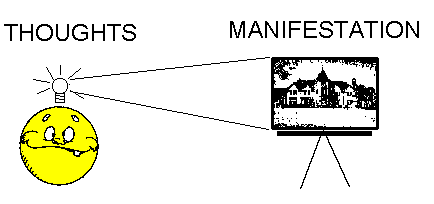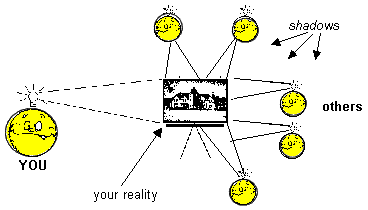I am - therefore I think
Before we get into the actual mechanics behind thought-creation, we're going to devote a chapter to the establishment of good consciousness. Good consciousness is the constructive use of your thoughts. As your reality-creation skills improve, so will your ability to affect the lives of those around you. When your ability to affect the lives of others increases, good consciousness becomes important, if not mandatory!
Your thoughts not only influence your own life but have an influence over the lives of others. This influencing is noticeable, to some degree, in your life now. For example, how many times have you said, "I knew that was going to happen to them!" or "I had a feeling that might occur to him." Well, however shocking this idea will seem, in many of those precognitive instances, you helped create that event, at that very moment. How can this influencing of other people's fate be? You can't make things happen to others by mere thoughts? Right? Wrong!

Physical reality is one big cooperative venture. You inhabit a small corner of the universe with billions of other people in an attempt to understand yourself and your abilities. One of the ways you learn about yourself is by the impact your thoughts have on your reality; that's called direct learning. Your thoughts impact against physical reality and physical reality mirrors back at you that reality that is coming from you. In other words, if you are filled with love and joy, most likely the world you perceive about you will reflect this love and joy. People will probably be pleasant and happy. Your physical surroundings will, also, reflect this attitude back toward you. When you look around, you are likely to see pleasing objects and people and things.
Now, this mirroring does not mean that your physical reality is devoid of all other aspects, other than what presently emanates from you. What this mirroring implies is that, generally, you will see what is within you manifest physically. If you looked hard enough, you would find the opposite, like hate and friction, as opposed to love and joy.
This discrepancy, in the mirroring-effect, from the internal to the external world, is due to your being part of a cooperative reality. In a cooperative reality, one person's mirror will reflect onto another person's mirror, to some degree. For example, the hate and friction you find in your reality of joy and love may be from someone else's mirror, not yours. This cooperative interaction of each other's mirrors helps keep you from falling into the trap of stagnation. You learn not only by your mistakes and merits, but by everyone else's mistakes and merits.

Now, because physical reality is a cooperative reality and because your mirror can affect another person's mirror, so can your thoughts affect another person's fate. This affecting of others' reality is where your responsibility lies. However, before we get into the responsibility end of thought-creation, let's try to better understand how your thoughts can affect another person's actions -- actions which that person has not yet even taken. To answer this question we need to explore briefly, probabilities and the Probability Universe. (For a more in depth look into the Probability Universe, see "Hermes' Reality Creator II," where a complete explanation is given.)
It is important to realize that beneath any physical event rides an infinite set of probable events. If these probable actions did not exist, you would not enjoy the freedom of choice you now have. In order to be able to choose, one must have choices. Now, these probable events are variations in the way a situation can occur. For example, will you choose the blue ball or the red ball. In the Probability Universe you have chosen them both. One probable version has you picking the red ball, while a second probable version has you picking the blue ball.

These multiple choices exist, except in physical reality, you can only materialize one version of a particular event -- you must decide which ball you are going to take, pulling one version out of the Probability Universe and experiencing that version within physical reality. However, the Probability Universe seldom only contains just two choices. It is more likely that in the Probability Universe, an infinite number of balls all exist -- all different colors, shapes, sizes, and flavors. To choose from an infinite number of events (or balls) in a matter of seconds, even for your unconscious mind, is far too complex a task, so, to make the selection simpler, an infinite number of probable events gets narrowed down to just a few and placed into a probability pool.

Your unconscious mind has direct access to this probability pool and many factors determine exactly which probable versions of an event will enter the probability pool. The main factor, in determining the selection within this pool, is you and what you need and desire. The next factor has to do with your own reality creation skills; how well do you understand the link between your thoughts and your manifestations? The remaining factors have much to do with the group consciousness: those other mirrors we mentioned earlier. The people involved with a particular situation have a hand in determining which probable versions of an event will appear in the probability pool, even your own probability pool! Your unconscious mind uses this probability pool to pick which probable version of an event to manifest. So, an infinite number of choices gets narrowed down to a finite number of choices; then you pick and choose one of those probable versions and physically manifest it. In the end, your unconscious mind looks to your conscious mind for direction as to which event it will pick. However, the point to note here is that your unconscious mind can only pick from the available choices in the pool. If a choice is not there, you can not materialize it.
This narrowing of choices within the probability pool is especially true just several moments before the actual manifestation of the event. At these critical moments, probable versions of an event can get eliminated from the pool rather quickly. If you are not careful, your current view of a situation can severely limit your choices from the pool as well as influence the choices that another individual has to choose out of their own pool. This affecting of other people's probability pool is where this chapter concerns itself -- especially since your thought-power will be increasing in the near future!
As your thought-power rises, it becomes increasingly important for you to try to use your thought-power in a responsible way. However, using your thought-power responsibly goes beyond merely guarding against thinking negatively and thinking in the most positive way possible. To think responsibly, especially when your thoughts involve others, you must go one step beyond that dualistic kind of thinking. You must think smartly!

Thinking smartly, with respect to others, involves taking into account the entire needs of the individual and refraining from making any predetermined decision, as to the outcome of a particular event. For example, a colleague may say to you that he may be getting ill. You could, at this moment, generate a thought that your colleague should be healthy and working hard. However, this thought, while positive in nature, may not be in the best interest of your colleague. Your colleague may be working too hard and is in need of a rest. Your coworker's impending illness may be a method by which he can get that rest. In this instance, thinking positively is inappropriate, possibly even selfish -- perhaps, unconsciously, you want your colleague to stay healthy because you would have no other person to talk with while on the job.
Now, thinking smartly, you would notice that your colleague seems tired from applying himself too vigorously and is showing signs of fatigue. You would then, perhaps, picture your colleague being refreshed and feeling renewed. Then, let your colleague decide what is best. He may decide to materialize that illness, just to get that rest; or he could go away for the weekend instead, renewing himself with a different kind of revitalization.
The important thing to note, in this example of thinking smartly, is that you are not counteracting probabilities concerning your coworker's needs. By thinking smartly, you will help your colleague to materialize a better situation for himself. Instead of limiting the amount of choices, within the probability pool, you have enlarged the selection. Perhaps that probable version, of going away for the weekend, would not have entered your coworker's probability pool, had you not envisioned your friend feeling refreshed and rested. In fact, that rest may be the repose that enables your colleague to perform better than he ever has.
Now, let's move from the concept of thinking smartly to the sister concept of thinking globally. Thinking globally, in a smart way, can be the most difficult area to handle responsibly; nonetheless, it is important to be just as thought-aware here as you are any other place.

Thinking globally involves smart thought-awareness when your thoughts involve other people with whom you have little or no physical contact (third-person individuals). It is here in this area that most people fumble and begin to prejudge and limit the probability pools of others. For example, when was the last time you thought about the effect that your opinion of a high-ranking official, like The President of the United States, would have on that important individual. Did you know that thinking inappropriately about such a person, even though you have no physical contact with that individual, makes it that much harder for that person to be the best he can? For example, if that individual is a leader, like The President, then I hope you would want that leader to make the best decisions possible, especially if those decisions affect you. Thinking, "That guy is a bad decision maker!" will not help that person to make good decisions. A better thought would be, "That guy needs to make better decisions!" The latter thought will help the individual to make more correct decisions and less incorrect decisions, without compromising your own opinion of him.
In a conscious way, thinking smartly and globally is a play on words; however, unconsciously it is much more. Without getting into great detail here (for we will cover the ways your unconscious mind operates in later sections of this book), your unconscious mind is notorious for taking strict interpretations from your conscious mind. The phrase, "That guy is a bad decision maker!" will be interpreted by your unconscious mind that this person is incapable of making a good decision. Your creative-power will try to create that situation for you, in any way possible. If that creating means limiting the probability pool of that individual, so that he can conform to that image, then that is what your unconscious mind will try to do. Your thought-power will move outward and cast a shadow on that other person's mirror. However because, in this instance, we're talking about a person with whom you have little or no contact, that shadow which is cast, will probably be negligible. Except, if enough people cast that same shadow on that same individual, then the effect will be anything but negligible and will probably be damaging.

In essence, the image projected by an individual is reflected back at that individual by the individual's peer group. For you and me that peer group is friends, loved ones, colleagues , etc. For a global personage that peer group is larger, composed of fans, voters, employees, etc. -- and, of course, you and me. Keep in mind that no view or impression of a person can reflect outward, if that person does not allow it or possess it on some level of awareness. But, what if the group consciousness is reflecting an image back which is inappropriate to a particular individual's growth and welfare, even if that individual is presently sending out that image? Perhaps that individual is trying to change his/her present persona into something better? The group consciousness, reflecting that poor image back at that person, will make the reality of that person changing that much more difficult. That person will have to fight not only his own inner conflict keeping him from improving, but the exterior conflict coming from his peer group. Thinking smartly about an individual, especially involving global personalities, will make it much easier for that person to make the internal changes necessary, so that they can evolve into a better individual.
So you see, thinking smartly and globally pays off in many respects. You will benefit, your friends will benefit, and even the world will benefit. Whenever your thoughts involve others, it is important that those thoughts allow others to experience their own personal freedoms -- freedoms all of us need and want. When you allow another person the right to choose his own path, while guiding and helping that person toward the best of probable actions, you are helping that person to transform into the best that person can be. That change begins on an individual level with each and every person's thoughts.
Important Points from this Chapter:
Before we end this chapter, we want to leave you with a question for you to ask yourself and resolve in your mind, "Does that particular person act the way [he/she] does because [he/she] is that way; or, does that particular person act the way [he/she] does because I think that they act that way inclined? Now, don't be too quick and too sure you know the correct answer to that one
In the next chapter you will learn exactly how your thoughts manifest into reality. Then we're going to give you a powerful exercise for your daily reality-creating. Get ready! You are one step away from becoming a Thought-Creator.
Worksheet Notes:
The worksheet on the next page will help you to become aware of your own thought processes. It will also make you aware of the impact your thoughts have on others. If done correctly, you will learn some amazing things about how your thought patterns create the reality you see around you. Furthermore, these notes will help alert you to areas of your life where you need to govern your thoughts more carefully.
Chapter 2 / The Power of Thought and its Responsibility
Worksheet Page
Instructions: Spend the next several days examining the contents of your mind. Here's a way you can do that. Set an alarm watch or clock to go off periodically during the course of your day -- four times a day will be sufficient. When the alarm sounds, take a moment and stop to examine what you are thinking about. Jot down this thought. Now continue on with your day. Do this record-keeping for four days. At the end of the fourth day, take out your list and look at what you have written. Examine the thoughts you have listed. Mark off whether they adhere to the proper guidelines of thinking smartly or globally. If not, try to transform that line of thinking into one that is more responsible. (NS = not sure)
-----------------------------------------------------------------------------------------
NO YES NS
DAY 1.
Hour 1: __________________________________________________________
____ ____ ____
Hour 2: __________________________________________________________ ____ ____ ____
Hour 3: __________________________________________________________ ____ ____ ____
Hour 4: __________________________________________________________ ____ ____ ____
DAY 2.
Hour 1: __________________________________________________________
____ ____ ____
Hour 2: __________________________________________________________ ____ ____ ____
Hour 3: __________________________________________________________ ____ ____ ____
Hour 4: __________________________________________________________ ____ ____ ____
DAY 3.
Hour 1: __________________________________________________________
____ ____ ____
Hour 2: __________________________________________________________ ____ ____ ____
Hour 3: __________________________________________________________ ____ ____ ____
Hour 4: __________________________________________________________ ____ ____ ____
DAY 4.
Hour 1: __________________________________________________________
____ ____ ____
Hour 2: __________________________________________________________ ____ ____ ____
Hour 3: __________________________________________________________ ____ ____ ____
Hour 4: __________________________________________________________ ____ ____ ____
This article is from the current Reality Creator Series Books, or upcoming books, or website content. © copyright 1995 - 2024 by Tom DeLiso